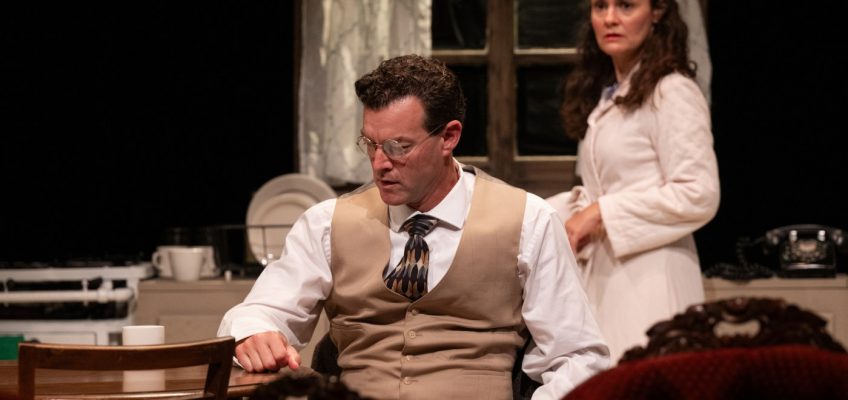With recent commemorations of the 80th anniversary of the end of World War II, it may be interesting to note that the celebrations and relief at war’s end soon gave way to a period of reflection that often led American artists to dark places. One of those artists was William Inge.
Encouraged to pursue playwriting by his contemporary, Tennessee Williams, Inge often populated his plays with people embittered by their life choices who didn’t transform over the course of the story, but rather came to some sort of acceptance about themselves. It was a style that fit the post-war Broadway zeitgeist, giving unhappy Midwesterners a voice onstage alongside Williams’ delusional Southerners and Arthur Miller’s angst-riddled New Yorkers.
The play that put Inge on the map was 1950’s “Come Back, Little Sheba,” a slice-of-life drama that takes us into the household of a Midwest chiropractor and his lonely, unfulfilled wife. It’s realism with a capital R, and that’s what you’ll find in Dark & Stormy Productions’ expertly executed production at St. Paul’s intimate Gremlin Theatre. What could be a musty museum piece in some hands is instead an involving trip in the theatrical time machine, propelled by powerful performances and transporting technical choices.
Dark & Stormy rarely tackles a work as old as “Come Back, Little Sheba,” but it does keep with the company’s customary focus on works with well-written women. In this case, Inge created such a vivid character in Lola Delaney that it’s easy to see why Shirley Booth won both a Tony and an Oscar for her portrayal.
While ostensibly cheerful, Lola clearly perceives something missing in her life, and it’s not just the prodigal dog of the title. She and husband Doc have taken in a boarder, a young woman college student for whom he feels protective while Lola enjoys observing her flirtations with a classmate and engaging in some of her own with the mailman and milkman.
As in several of Tennessee Williams’ plays of the same period, alcoholism is an issue, but Inge’s characters don’t romanticize addiction or wax poetic about their almost certainly unattainable hopes. His characters talk like real people, and this production brings them to bracing life, particularly through the performances of Sara Marsh as Lola and Peter Christian Hansen as Doc. Gremlin’s small space allows audiences to observe at close range the complex layers of Marsh’s conflicted Lola and Hansen’s tortured Doc. Their portrayals draw you in ever deeper, making an explosive second-act reckoning all the more jarring and effective.
Director Brian Joyce has clearly encouraged his eight-member cast to make their characters as realistic as possible, and each actor comes through with a solid performance, right down to Jack Bechard finding nuance within a libido-driven college boy and Katherine Kupiecki summoning up palpable compassion from a neighbor who at first seems merely the necessary ear for Lola’s monologues.
They’re all aided greatly by Bobbie Smith’s period-perfect set, Shannon Elliott’s creative lighting scheme and the sound design of Aaron Newman. The latter becomes something of a character of its own, using what comes out of the household radio to shape the mood, be it to spark nostalgic escapism or underline the sense of loss that permeates this very well done production.
Rob Hubbard can be reached at wordhub@yahoo.com.
Dark & Stormy Productions’ ‘Come Back, Little Sheba’
When: Through Sept. 7
Where: Gremlin Theatre, 550 Vandalia St., St. Paul
Tickets: $49-$45, available at darkstormy.org
Capsule: Full of fine acting, it’s impressively faithful to 1950.
Related Articles
Theater review: Brave New Workshop’s latest is funniest at the federal level
Review: Orpheum Theatre hosts a beauty of a ‘Beauty and the Beast’
Fringe review: ‘What I Should Have Said’ is a good concept with very rocky execution
Fringe review: Historical drama ‘Tompkins Squares’ is stiff and underwhelming
Fringe review: ‘Breach,’ ferocious, thrilling and shrewd, is simply stunning theater


Leave a Reply